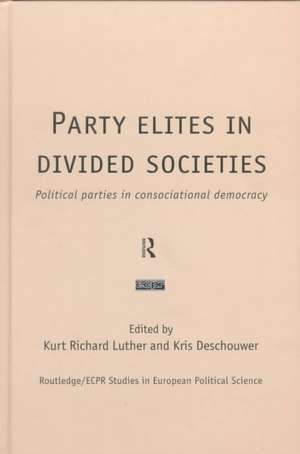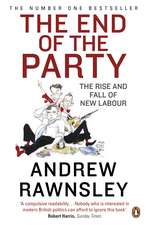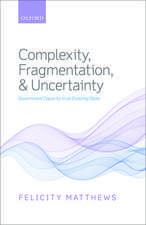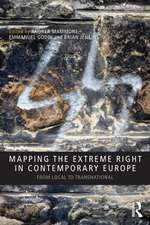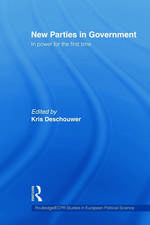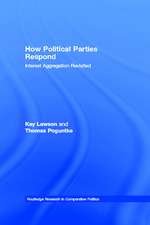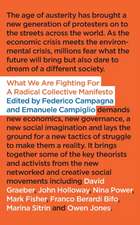Party Elites in Divided Societies: Political Parties in Consociational Democracy: Routledge/ECPR Studies in European Political Science
Editat de Kris Deschouwer, Kurt Richard Lutheren Limba Engleză Hardback – 26 aug 1999
Din seria Routledge/ECPR Studies in European Political Science
- 15%
 Preț: 410.82 lei
Preț: 410.82 lei -
 Preț: 416.96 lei
Preț: 416.96 lei - 18%
 Preț: 1060.52 lei
Preț: 1060.52 lei - 49%
 Preț: 545.76 lei
Preț: 545.76 lei - 18%
 Preț: 1115.33 lei
Preț: 1115.33 lei - 18%
 Preț: 240.30 lei
Preț: 240.30 lei - 18%
 Preț: 1002.63 lei
Preț: 1002.63 lei - 18%
 Preț: 1002.50 lei
Preț: 1002.50 lei - 18%
 Preț: 1111.55 lei
Preț: 1111.55 lei - 15%
 Preț: 303.01 lei
Preț: 303.01 lei - 18%
 Preț: 1118.46 lei
Preț: 1118.46 lei -
 Preț: 416.26 lei
Preț: 416.26 lei - 18%
 Preț: 1002.99 lei
Preț: 1002.99 lei - 18%
 Preț: 733.11 lei
Preț: 733.11 lei - 18%
 Preț: 1005.34 lei
Preț: 1005.34 lei - 18%
 Preț: 1112.34 lei
Preț: 1112.34 lei - 18%
 Preț: 1064.01 lei
Preț: 1064.01 lei - 18%
 Preț: 1117.43 lei
Preț: 1117.43 lei -
 Preț: 310.83 lei
Preț: 310.83 lei - 28%
 Preț: 824.17 lei
Preț: 824.17 lei - 18%
 Preț: 1112.53 lei
Preț: 1112.53 lei - 18%
 Preț: 1057.75 lei
Preț: 1057.75 lei - 28%
 Preț: 711.92 lei
Preț: 711.92 lei -
 Preț: 287.41 lei
Preț: 287.41 lei - 18%
 Preț: 1009.55 lei
Preț: 1009.55 lei - 18%
 Preț: 1002.50 lei
Preț: 1002.50 lei -
 Preț: 199.65 lei
Preț: 199.65 lei - 18%
 Preț: 1004.20 lei
Preț: 1004.20 lei -
 Preț: 413.94 lei
Preț: 413.94 lei - 31%
 Preț: 764.87 lei
Preț: 764.87 lei - 18%
 Preț: 1116.38 lei
Preț: 1116.38 lei - 18%
 Preț: 1060.87 lei
Preț: 1060.87 lei - 31%
 Preț: 765.43 lei
Preț: 765.43 lei - 18%
 Preț: 1058.65 lei
Preț: 1058.65 lei - 18%
 Preț: 1058.38 lei
Preț: 1058.38 lei - 49%
 Preț: 546.84 lei
Preț: 546.84 lei - 18%
 Preț: 1108.42 lei
Preț: 1108.42 lei - 18%
 Preț: 1113.12 lei
Preț: 1113.12 lei - 28%
 Preț: 823.63 lei
Preț: 823.63 lei - 18%
 Preț: 1001.70 lei
Preț: 1001.70 lei -
 Preț: 392.24 lei
Preț: 392.24 lei - 18%
 Preț: 1002.63 lei
Preț: 1002.63 lei - 28%
 Preț: 824.53 lei
Preț: 824.53 lei - 18%
 Preț: 1112.34 lei
Preț: 1112.34 lei - 25%
 Preț: 476.48 lei
Preț: 476.48 lei -
 Preț: 487.37 lei
Preț: 487.37 lei
Preț: 1003.43 lei
Preț vechi: 1223.70 lei
-18% Nou
Puncte Express: 1505
Preț estimativ în valută:
192.03€ • 208.52$ • 161.30£
192.03€ • 208.52$ • 161.30£
Carte tipărită la comandă
Livrare economică 22 aprilie-06 mai
Preluare comenzi: 021 569.72.76
Specificații
ISBN-13: 9780415201278
ISBN-10: 0415201276
Pagini: 312
Ilustrații: 57 tables
Dimensiuni: 156 x 234 x 19 mm
Greutate: 0.54 kg
Ediția:New.
Editura: Taylor & Francis
Colecția Routledge
Seria Routledge/ECPR Studies in European Political Science
Locul publicării:Oxford, United Kingdom
ISBN-10: 0415201276
Pagini: 312
Ilustrații: 57 tables
Dimensiuni: 156 x 234 x 19 mm
Greutate: 0.54 kg
Ediția:New.
Editura: Taylor & Francis
Colecția Routledge
Seria Routledge/ECPR Studies in European Political Science
Locul publicării:Oxford, United Kingdom
Public țintă
PostgraduateCuprins
Part 1 Introduction: The Significance of Party Elites 1. A framework for the comparative analysis of political parties and party systems in consocational democracy Kurt Richard Luther 2. The utility of party and institutional indicators of change in consocational democracies Paul Pennings, Vrije University, Amsterdam, The Netherlands Part 2. Comparative Country Studies 3. Must what goes up always come down? Of pillars and arches in Austria's political architecture Kurt Richard Luther 4. From consocation to federation: how the Belgian parties won Kris Deschouwer 5. Parties, pillars and the politics of accommodation: weak or weakening linkages? The case of Dutch consocationalism. Rudy Andeweg, Leiden University, The Netherlands 6. The odd fellow: parties and consocationalalism in Switzerland Pascal Sciarini and Simon Hug both at University of Geneva, Switzerland 7. Israel and the consocational model: religion and class in the Israeli party system, from consocationalism to consensualism to majoritarianism Reuvan Hazan, Hebrew University of Jerusalem, Israel Part 3. Party Dimensions in Comparative Perspective 8. Electoral consequences of depillarisation: the case of Austria, Belgium and the Netherlands (1945-1996) Monica Mendez-Lago, University of Salamanca, Spain 9. The consocational party system Steve Wolinetz, Memorial University of Newfoundland, Canada 10. 'Prudent leadership' to successful adaptation? Pillar parties and consocational democracy thirty years on Kurt Richard Luther and Kris Deschouwer
Notă biografică
Kris Deschouwer, Kurt Richard Luther
Descriere
It offers a valuable and long overdue assessment of the role of political parties in the theory and practice of consociational demococracy. Combining valuable theoretical and comparative analyses with sensitive in-depth case studies.
